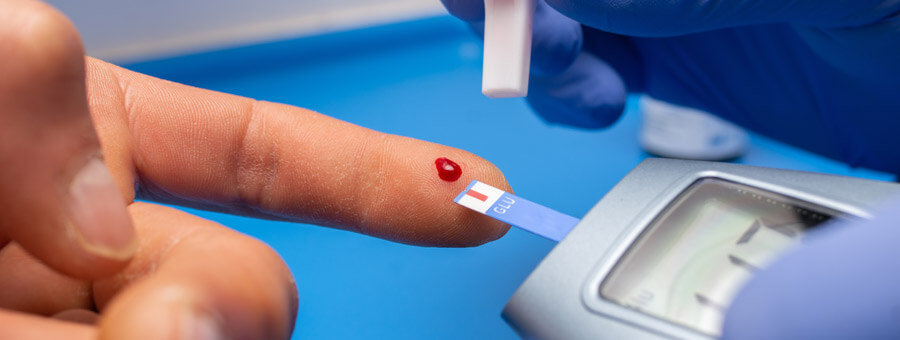
Diabetes Tests
Diabetes tests are diagnostic evaluations used to detect diabetes, monitor blood sugar levels, and assess how well the body manages glucose. These tests help healthcare providers diagnose diabetes, determine its severity, and develop appropriate treatment plans. Common diabetes tests include:
Fasting Blood Sugar (FBS) Test: Measures blood sugar levels after an overnight fast. Elevated levels can indicate diabetes or prediabetes.
Random Blood Sugar (RBS) Test: Measures blood sugar levels at any time of the day without fasting. High levels can indicate diabetes.
Oral Glucose Tolerance Test (OGTT): Measures blood sugar levels before and after drinking a glucose-rich solution. This test is often used to diagnose gestational diabetes and assess how the body handles glucose.
Hemoglobin A1c (HbA1c) Test: Measures the average blood sugar levels over the past 2-3 months by assessing the amount of glucose attached to hemoglobin in red blood cells. An HbA1c level of 6.5% or higher indicates diabetes.
C-Peptide Test: Measures the level of C-peptide, which is produced when insulin is made. It helps distinguish between type 1 and type 2 diabetes and assess insulin production.
Fructosamine Test: Measures average blood sugar levels over the past 2-3 weeks by assessing the amount of glucose attached to proteins in the blood. It is useful for monitoring diabetes control.
Insulin Level Test: Measures the amount of insulin in the blood. Abnormal levels can help diagnose and differentiate between types of diabetes.
Ketone Test: Measures the level of ketones (byproducts of fat metabolism) in the blood or urine. High levels can indicate diabetic ketoacidosis (DKA), a serious complication of diabetes.
Autoantibody Tests: Detect the presence of autoantibodies that target insulin-producing cells in the pancreas. These tests help diagnose type 1 diabetes and differentiate it from type 2 diabetes.
Continuous Glucose Monitoring (CGM): Involves wearing a small sensor under the skin to continuously monitor blood sugar levels throughout the day and night. It provides detailed information on glucose trends and patterns.
Glucose Challenge Test: A screening test for gestational diabetes where blood sugar levels are measured after drinking a glucose solution. If levels are high, a follow-up OGTT is done for confirmation.
At AMMA DIAGNOSTIC CENTRE, we offer a comprehensive range of diabetes tests to diagnose and manage diabetes effectively. Our experienced team uses advanced technologies and techniques to provide accurate and timely results, along with personalized treatment recommendations based on your test results.
- Lorem Ipsum has been the industry.
- Dummy text ever since unknown.
- Printer took a galley of type it to.
- Make a type specime book has survi.
- Not five centuries, but also the leap.
- Electronic setting remain essential.
- Release sheets containing passages.
- Lorem Ipsum has been the industry.
- Dummy text ever since unknown.
- Printer took a galley of type it to.
- Make a type specime book has survi.
- Not five centuries, but also the leap.
- Electronic setting remain essential.
- Release sheets containing passages.

What do the results mean?
Lorem Ipsum has been the industry's standard dummy text ever since the when an unknown printer on took a galley of type scrambled it to make a type specimen book it has survived and not five centuries be also the leap into electronic typesetting remaining essentially and unchanged. It was popularised in with the release sheets containing passages and more recently with desktop.
Lorem Ipsum has been the industry's standard dummy text ever since the when an unknown took galley of type scrambled it to make a type specimen book it has survived and not five centuries be also the leap into electronic typesetting remaining essential.
